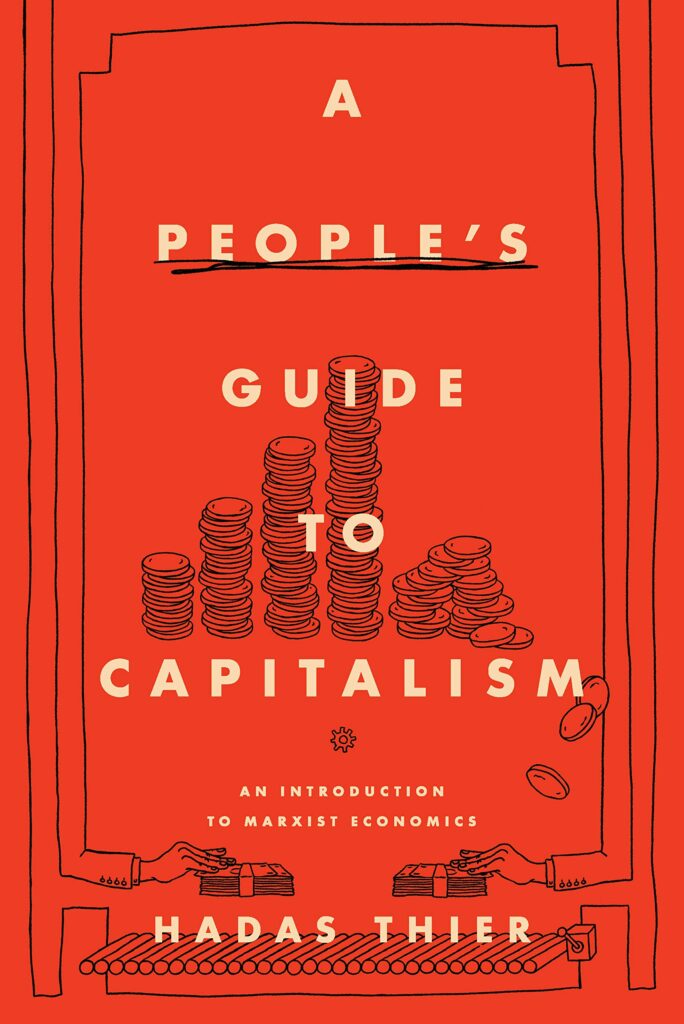
Hadas Thier’s new introduction to Marxist economics, A People’s Guide to Capitalism, has been hailed as “an important primer for generations of activists.” Industrial Worker recently spoke with Thier about the book, her motivations for writing it and what she hopes working-class readers will take away from it. The interview below has been edited for clarity and length.
Industrial Worker: It seems like the main motivation for you in writing this book was to simplify Marxism. Is that a fair assessment?
Hadas Thier: Yeah, what I tried to do was simplify it, in the sense of making these concepts more accessible — but not actually simplify the concepts themselves, in terms of the content. I try to approach the reader with the utmost respect and the assumption that the reader wants to understand, and can understand, complex concepts. But to understand those complex concepts, it’s helpful to break them down as clearly as possible — to explain things in as contemporary a way as possible. Because the purpose of Marxism is not academic exercise, but to understand the world around us.
How do we show people that an alternative to capitalism is possible? That we do not have to live in this system?
Capitalism is the air that we breathe, in the sense that everything about the way that our society operates is driven by this economic system of exploitation and it’s become so naturalized that we don’t even notice it. It’s driven by relationships between things, instead of relationships between people.
Capitalism is a very recent invention, relatively speaking, in human history. The example that I use in my book is that, if you were to compress all of human history into a 24-hour period, capitalism represents the last three minutes of that day. It is relatively new and it has a historical beginning — and that means it can also have a historical end.
How do we deal with the ability of capitalism to keep itself alive through crisis? For example: how capitalism can use credit to allow workers to get by, even when they are not paid enough to live on their wages.
Capitalism is an incredibly adaptive system. Karl Marx talked about some of these issues — certainly about credit and financialization, although he couldn’t have predicted all the warped and bizarre ways that it’s developed over time. Marx wrote about some of these things, but I think on the whole, he sort of underestimated the extent to which capitalism would adapt and transform itself.
The economic crises that capitalism has gone through — it goes through them very regularly. Sometimes they are cataclysmic crises that throw tens of millions, hundreds of millions of people’s lives into complete devastation and disarray. Whether that’s the Great Depression or the current crisis, which has looked a lot different, it obviously continues to take a huge toll on people’s lives.
As long as the working class is made to pay for those crises — whether it’s through austerity, sometimes through fascism, sometimes through wars — capitalism always will pick up the pieces. The only way for capitalism to ultimately be transformed is if our side is organized effectively enough, deeply enough, widely enough to refuse to be the ones to pay the price for the crisis, to refuse to prop up a new round of profits.
Do you think the most important thing for people to take away from this book is that Marxism is a tool for working people to organize for better circumstances?
Yeah, absolutely. I think part of what’s important is to understand who’s on whose side. There are two classes that are fundamentally opposed, in terms of material interests: the working class and the capitalist class. When you see that there’s opposing material interests — that the capitalist class only enriches itself by exploiting the working class, which is the vast majority of society — it is clear who’s on whose side.
Where do we go from here? How do we convince people of the realities of our economic system, especially regarding workers organizing their workplaces?
The first starting point is the mythology — the mythology that we’re all free, but within a very specific and constrained context of needing to work for a wage in order to survive. We need to work for somebody else and to produce a profit for somebody else in order to sustain our lives and our families. That’s really the starting point: to wake people up to the reality that society can be arranged otherwise.
Interested in learning more? Find A People’s Guide to Capitalism in the IWW Store.
